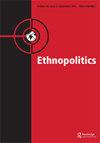How Humanitarian and Stabilization Actors Contribute (Unwittingly?) to Post-Conflict Justice
IF 1.2
Q3 ETHNIC STUDIES
引用次数: 0
Abstract
Abstract The construction of victimhood after conflict is contentious and relies in part upon public recognition. This article argues that humanitarian and stabilization actors often provide this recognition and thereby contribute to the construction of post-conflict conceptions of victimhood. It analyses how key operational documents produced by humanitarian and stabilization actors in Iraq during the period of conflict with the Islamic State (2014–2017) constructed and recognized a particular profile of victim, and only certain perpetrators. This resulted in the exclusion and silencing of complex victims and contributed to the tolerance of violence directed against them. The article concludes with some reflections on the implications of these findings for practitioners.人道主义和稳定行动者如何(不知不觉地)为冲突后司法作出贡献
冲突后受害者身份的构建是有争议的,部分依赖于公众的认可。这篇文章认为,人道主义和稳定行动者经常提供这种承认,从而有助于构建冲突后的受害者概念。它分析了伊拉克人道主义和稳定行为者在与伊斯兰国冲突期间(2014-2017年)编制的关键行动文件是如何构建和识别受害者的特定特征的,而只是识别某些肇事者。这导致了对复杂受害者的排斥和沉默,并有助于容忍针对他们的暴力行为。文章最后对这些发现对从业者的启示进行了一些思考。
本文章由计算机程序翻译,如有差异,请以英文原文为准。
求助全文
约1分钟内获得全文
求助全文

 求助内容:
求助内容: 应助结果提醒方式:
应助结果提醒方式:


